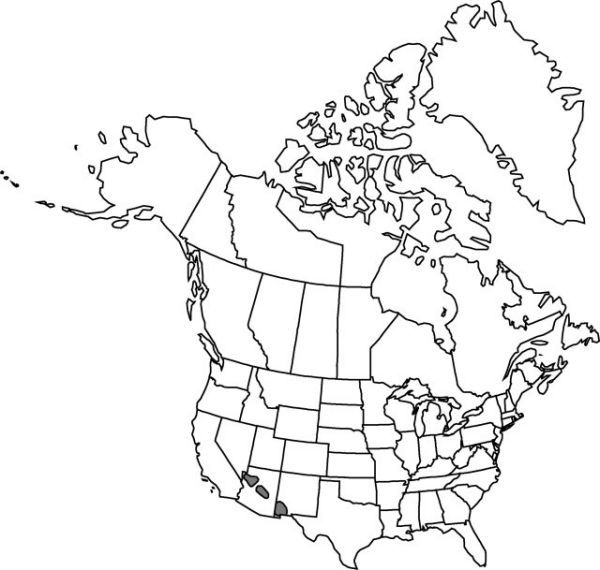Difference between revisions of "Allium bigelovii"
Botany (Fortieth Parallel), 487, plate 38, figs. 8, 9. 1871.
FNA>Volume Importer |
imported>Volume Importer |
||
| (6 intermediate revisions by 2 users not shown) | |||
| Line 6: | Line 6: | ||
|place=487, plate 38, figs. 8, 9. 1871 | |place=487, plate 38, figs. 8, 9. 1871 | ||
|year=1871 | |year=1871 | ||
| + | }} | ||
| + | |special_status={{Treatment/ID/Special_status | ||
| + | |code=E | ||
| + | |label=Endemic | ||
}} | }} | ||
|basionyms= | |basionyms= | ||
| Line 23: | Line 27: | ||
|elevation=500–1700 m | |elevation=500–1700 m | ||
|distribution=Ariz.;N.Mex. | |distribution=Ariz.;N.Mex. | ||
| − | |discussion=<p>Allium bigelovii is an anomalous species that does not appear to be closely related to any other from North America. With its prominent ovarian crests, a relationship with the group of species around A. fimbriatum, A. nevadense, and A. sanbornii is suggested. Allium bigelovii differs from this group, however, in having two leaves and a seed coat with smooth cells. In addition its bulb-coat reticulation is unlike that of any other North American species.</p> | + | |discussion=<p><i>Allium bigelovii</i> is an anomalous species that does not appear to be closely related to any other from North America. With its prominent ovarian crests, a relationship with the group of species around <i>A. fimbriatum</i>, <i>A. nevadense</i>, and <i>A. sanbornii</i> is suggested. <i>Allium bigelovii</i> differs from this group, however, in having two leaves and a seed coat with smooth cells. In addition its bulb-coat reticulation is unlike that of any other North American species.</p> |
|tables= | |tables= | ||
|references= | |references= | ||
| Line 32: | Line 36: | ||
-->{{#Taxon: | -->{{#Taxon: | ||
name=Allium bigelovii | name=Allium bigelovii | ||
| − | |||
|authority=S. Watson | |authority=S. Watson | ||
|rank=species | |rank=species | ||
| Line 46: | Line 49: | ||
|publication title=Botany (Fortieth Parallel), | |publication title=Botany (Fortieth Parallel), | ||
|publication year=1871 | |publication year=1871 | ||
| − | |special status= | + | |special status=Endemic |
| − | |source xml=https:// | + | |source xml=https://bitbucket.org/aafc-mbb/fna-data-curation/src/2e0870ddd59836b60bcf96646a41e87ea5a5943a/coarse_grained_fna_xml/V26/V26_478.xml |
|genus=Allium | |genus=Allium | ||
|species=Allium bigelovii | |species=Allium bigelovii | ||
Latest revision as of 21:15, 5 November 2020
Bulbs usually solitary, not clustered on stout primary rhizome, ± globose, 1–1.5 × 1.2–1.5 cm; outer coats enclosing single bulb, dark brown, prominently reticulate, membranous, cells irregularly arranged, vertically elongate, rectangular to ± contorted, without fibers; inner coats white, cells obscure, quadrate. Leaves persistent, green at anthesis, 2, basally sheathing, sheaths not extending much above soil surface; blade solid, subterete to channeled, 16–21 cm × 2–4 mm, margins entire. Scape persistent, solitary, erect, solid, terete, 5–12 cm × 1–4 mm. Umbel persistent, erect, loose to ± compact, 10–25-flowered, hemispheric, bulbils unknown; spathe bracts persistent, 2, 2–11-veined, lance-ovate to ovate, ± equal, apex acute to acuminate. Flowers campanulate, (8–)10–14 mm; tepals erect, pink to reddish at tip and along midvein, otherwise white, lanceolate, ± equal, becoming papery and ± rigid in fruit, margins entire, apex acute; stamens included; anthers purple; pollen yellow; ovary crested; processes 6, prominent, flat, triangular, margins entire to coarsely toothed; style linear, equaling stamens; stigma capitate, scarcely thickened, obscurely 3-lobed; pedicel 10–15 mm. Seed coat shining; cells smooth. 2n = 14.
Phenology: Flowering late Mar–May.
Habitat: Open, rocky, gravelly slopes
Elevation: 500–1700 m
Discussion
Allium bigelovii is an anomalous species that does not appear to be closely related to any other from North America. With its prominent ovarian crests, a relationship with the group of species around A. fimbriatum, A. nevadense, and A. sanbornii is suggested. Allium bigelovii differs from this group, however, in having two leaves and a seed coat with smooth cells. In addition its bulb-coat reticulation is unlike that of any other North American species.
Selected References
None.
